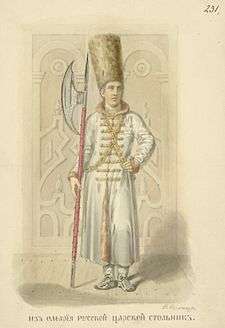Stolnik
Stolnik was a court office in Poland and Muscovy, responsible for serving the royal table, then an honorary court title and a district office.
Stolnik in Crown of Poland and Grand Duchy of Lithuania
In the Crown of Poland under the first Piast dukes and kings, this was a court office.
From the 14th century, it was an honorary court title in the Polish Kingdom and later in the Polish-Lithuanian Commonwealth, since the 16th century.
- Stolnik wielki koronny — Grand Pantler of the Crown
- Stolnik wielki litewski — Grand Pantler of Lithuania
- Stolnik koronny — Pantler of the Crown
- Stolnik litewski — Pantler of Lithuania
- Stolnik nadworny koronny — Court Pantler of the Crown
According to the 1768 district office hierarchy, the stolnik's position in the Crown of Poland was superior to that of podczaszy and inferior to that of district judge; in the Grand Duchy of Lithuania, superior to podstoli and inferior to wojski.
Stolnik in Muscovy

Stolniks (Russian: сто́льник, IPA: [ˈstolʲnʲɪk]) were known as palace servants of the Russian rulers since the 12th century. In the 16th and 17th centuries they were young nobles who brought dishes to the tsar's table, looked after his bedroom, and accompanied him in travels. The highest category comprised the room or closer stolniks.
Stolniks could simultaneously serve in the foreign office or in the army. They were ranked fifth in the hierarchy of Muscovite bureaucracy, after boyars, okolnichys, duma nobles, and duma dyaks.
Stolniks were also attached to episcopal administrations as were other similar offices also found in the grand princely or tsarist administration. For example, stolniks are found in documents from the archiepiscopal records in Veliky Novgorod.[1]
See also
References
- ↑ B. D. (Boris Dmitrevich) Grekov, Novgorodskii Dom sviatoi Sofii; opyt izucheniia organizatsii i vnutrennikh otnoshenii krupnoi tserkovnoi votchiny, chast” I (St. Petersburg: M. Aleksandrova, 1914. Reprinted in Izbrannye trudy, vol. 4: 7-436).